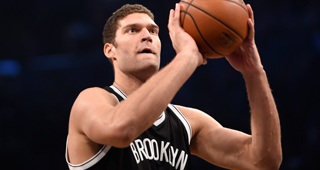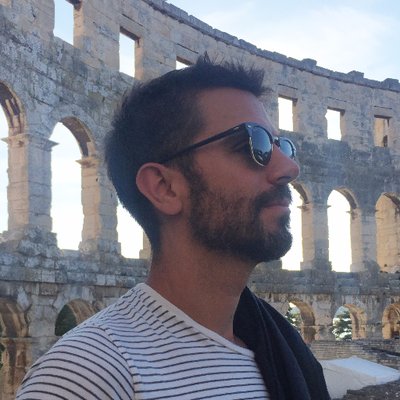Atoning for one of the final mistakes of the Mitch Kupchak/Jim Buss era, the Los Angeles Lakers traded away the three years remaining on the burdensome, regrettable contract of Timofey Mozgov to the Brooklyn Nets for Brook Lopez and the No. 27 pick in the draft. The cost, however, was D’Angelo Russell, who the Lakers picked in 2015 over Kristaps Porzingis.
The future of Russell with the Lakers initially became tenuous during a tabloid incident with Nick Young during his rookie season, continue with their frustrations on a variety of personal levels, and then grew almost irrevocably impossible when they secured the No. 2 overall pick at the lottery. Barring a blockbuster trade, the Lakers were going to end up with either Lonzo Ball or Markelle Fultz, which meant there would be less than ideal overlap with Russell either way.
Mozgov’s four-year, $64 million deal with the Lakers last summer was literally the first agreement of the offseason, and instantly looked like a desperate, shortsighted overpay. Mozgov didn’t match the Lakers’ timetable of contention and was barely a player capable of rotation minutes before he even arrived with the Lakers. The Lakers misread the center market where there were way more players than there are available minutes with teams are increasingly playing non-traditional centers a meaningful amount of minutes at the position as well.
Losing Russell to dump the salary of someone signed less than a year ago is a prime example of the misallocation of resources, but it’s a necessary part of their plan to clear enough cap space to sign two max players in 2018. Whether they trade for Paul George or sign him in 2018, the Lakers also want to be in a position to sign a second star whether it becomes LeBron James, DeMarcus Cousins or Russell Westbrook. The Lakers could have waited one summer to unload Mozgov's contract when it only has two years remaining instead of three, but that could have cost them future picks in a more desperate, time-sensitive situation needed to close out free agency signings in hand instead of conceptually a year out.
Once and for all, not all cap space should be treated the same way and the Lakers, New York Knicks and a handful of other franchises need to realize there will always be a Paul George out there eager to play for your franchise no matter how many times you fail on the likes of LaMarcus Aldridge and Greg Monroe.
Lopez will likely be a one-year rental for the Lakers even though he has remained healthy and productive in each of the past three seasons. Lopez is still just 29 and even began shooting and making a lot of three-pointers last season. If the Lakers strike out on the second max free agent, they could perhaps offer Lopez a sizable one-year deal in 2018, but he’s quite clearly their fallback option. In the interim, Lopez is a professional, borderline All-Star that will contribute to the Lakers being significantly more competitive in 17-18, which will be particularly important if they acquire George this offseason.
The Lakers also picked up an extra late first rounder, which is extremely valuable for teams short on young cost controlled assets and could be flipped as part of a George trade if they don’t use it for themselves. It feels like a throw-in for the trade but getting back a first rounder two days before the draft can't be overlooked.
Grade for Lakers: A
The Nets continue to use their cap space and the certainty they are unambiguously rebuilding to improve their team in the long-term, knowing that there will be no quick turnarounds. Brooklyn will absorb the remaining $54 million on Mozgov’s contract to bet on Russell reaching his potential in a new situation. This is certainly a better use of their unique financial resources than signing more restricted free agent to offer sheets that are matched, albeit fortuitously in the case of Allen Crabbe. The Pistons weren’t going to let Kentavious Caldwell-Pope leave for Brooklyn and the same goes for Otto Porter and the Wizards.
Russell’s game fits the direction of the NBA with his perimeter shooting off the dribble and playmaking for others. Russell’s rookie season couldn’t have been more frustrating playing under Byron Scott and alongside Kobe Bryant. Russell improved by virtually every metric, particularly his assist rate and free throw rate in his second season. Russell didn’t look quite as appealing after two seasons as he did in June of 2015, but he’s only 21 and still can be a multi-time All-Star.
The next step of Russell’s career will take place in a low pressure situation with the Nets playing for Kenny Atkinson, who specializes in maximizing the potential of point guards. Atkinson runs a fun system that values spacing and three-pointers. It could be empty stats until his supporting cast improve, but there’s little doubt Russell will be at the very least putting up numbers with the Nets.
Grade for Nets: A



